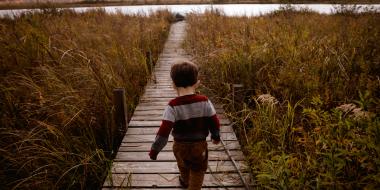Several years ago, I met a 12-year-old boy who had developed severe anxiety following a break-in at his family’s home while they were away on vacation. To cope with his alarm about this intrusion and the fears of a potential recurrence, he became obsessed with home safety, particularly with checking the locks. This developed into a compulsive lock-checking routine in which he locked and relocked windows and doors in a certain order a certain amount of times before bed, sometimes taking up to two hours each night.
His worried parents sought the guidance of a mental health professional, who advised them to stop playing into their son’s lock-checking routine, as it was succeeding only in validating his worries. They followed the advice, and blocked him from performing his nightly rituals. But rather than a subsiding of alarm and compulsions, as they had hoped, there was instead an escalation. He became unable to sleep, developed eczema, and his compulsions shifted to other things: obsessions about bedtimes, goodbyes, and cleanliness rituals. It was a little like that whack-a-mole game you play at the carnival. Whacking down the lock-checking compulsion did not make it go away; it just popped up elsewhere in a different form.
LOCKING IN ON ALARM: THE KEYS TO SUCCESS
When we are in a state of alarm, we aren’t operating from a rational mind. Rather we are in a perpetual limbic state, driven by reactive and instinctual emotions rather than logical thought. Trying to reason with that, or attempting to stifle the associated behaviours, sends the message that our core need of safety within a space of emotional rest has gone unmet, leaving us feeling completely misunderstood.
What their son needed was emotional rest. He was in a constant state of alarm, unable to be settled, and the very people he needed to provide that emotional rest had been instructed not to. He needed a strong parent-child relationship to be the guiding foundation on which he could lean, have an opportunity to catch his limbic breath, and ultimately bring calm to the alarm centre of his brain.
Cultivate deep dependence
What does it look like to create space and invitation for this kind of emotional rest for your child? A parent's role is to create the space and provide the invitation for the child to lean on them and rest, creating a deep dependence. When a child can deeply depend on a parent, they are then able to summon the energy and courage to deal with anxiety. As a parent, part of embracing this role means also embracing that lock-checking routine, or whatever iteration of that is presenting for your child. Step in and take charge for them, doing it before your child even asks. Be so on top of it that there can be no doubt in your child’s mind that you’ve got this.
What an incredible way to both acknowledge what your child is feeling and to honour their desire to feel safe! By taking the lead on their behalf, you are releasing them from the angst-ridden role of having to be in charge. And with that, your child gets to lean in and be dependent on you. Your child gets to take a breath. And another. And slowly but surely, over days and weeks, their hyper-firing alarm system will come to rest.
One of the gifts that comes out of having your child feel so beautifully seen and heard by you is that their renewed sense of safety may have them feeling more able to let out all of the vulnerable emotions they have been holding in. I refer to this as the “gets worse before it gets better” stage. It doesn’t happen for all children but is relatively common for those who are very anxious to go to pieces in an eruption of feeling and emotions just when their world begins to feel safe again. This is a sign that you—the big person for your child—are doing it perfectly! This too will pass.
Lock it down
If you are bowled over by your own anxiety, take a moment to consider where this is coming from. Helicopter parenting is born of a parent’s acquiescence to their own anxiety-driven needs. Continuously swooping in to rescue their child in a self-serving manner only serves to escalate the child’s anxiety.
Children are stunningly good at reading the energy of their grown-ups, so if you can relate to this mindset, a little self-work can help. Investigate your own subconscious narratives around why you feel unsafe in the world. What is it that you seek to control? What are your worries, obsessions, and compulsions? Get to the root of this by really understanding where you have come from, your own childhood, and thus, how it was that your mind was formed. Take some time to tend to those ungrown parts of yourself as you work to become fully present for your child.
From struggle to settled
Your child’s emotional self will begin to settle and their rational brain will slowly re-emerge. This is where a gentle press forward in terms of changing and challenging beliefs can start to take place. The key is to know when to press forward and when to hang back. And when it is a press-forward moment, embrace it with the intention of doing right by them instead of being overcome by your own anxiety that it might be too much.
Allow opportunities for your child to face a bit of struggle or resistance with the things in life that they are likely to encounter. But keep it to baby steps: this isn’t a sink or swim kind of exercise. You want to move at the speed of trust, allowing your child to take a step forward when the time is right, and providing a soft landing place for when courage is fleeting or for when it simply doesn’t go as hoped.
…move at the speed of trust, allowing your child to take a step forward when the time is right, and providing a soft landing place for when courage is fleeting…
As you continue to step into the lead as your child’s guide and safe haven, they will increasingly become more emboldened, settled, and aware of their emotions. We don’t ever want to push so hard that they become hardened to their feelings. Courage, after all, isn’t the absence of fear, rather, it is being afraid but pressing forward anyway.
Eventually, there will come a day when your child is doing really well and the anxiety will be a faded memory, when seemingly out of nowhere, it might re-emerge. It can feel much harder the second or third time around because you remember how challenging it was to get in front of it the first time. However, most often these reappearances are short-lived. But it is much like learning to ride a bike: kind of tricky at the beginning, and you might find you feel a little shaky at first if you come back to it after a bit of a break, but soon enough you and your child will be back on track.
As for the boy with the lock-checking compulsion? He responded immediately to his parents stepping in and taking charge of that for him, resting into their capable care. They, too, felt relieved, as taking care of him resonated much more with them. Soon enough, as his parents continued to direct and be in the lead of lock-checking, his brain had settled out of its ongoing alarmed state, he started sleeping better, and returned to his previously carefree self. Eventually the lock-checking routine faded away, and his beliefs about the safety of his world were solidly in place. He is now a young university student, happy and settled in the life he is living.
Anxiety is a big thing. It is a thing of epidemic proportions. Approximately 1 in 5 of us are clinically symptomatic at some point, and the numbers are growing. It is not going to be just psychologists and other mental health professionals who are on the front lines helping children: it’s going to be—and perhaps ideally and appropriately so—the parents and other adults who walking alongside them every day. If you’re journeying through anxiety with your child, remember to always to start at the very beginning, with your relationship as the foundation. Invite the lean-in and wait for emotional rest to settle into place. Deep dependence, first and foremost, is that answer. As the settling occurs for your child, wisely and intuitively begin with baby steps forward into the things that challenge. And eventually, you will stand in awe of the courage that shines forth.
You may also enjoy: The Emotional Roots of Anxiety in Children, Helping Your Child To Cope With Anxiety, and How Can You Tell the Difference Between Stress and Anxiety?






